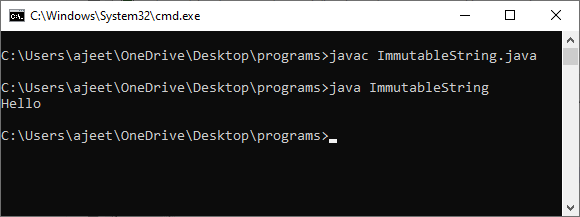Why Are Strings Immutable in Java? Important Expertise for Programmers
Why Are Strings Immutable in Java? Important Expertise for Programmers
Blog Article
What Is Unalterable Strings and How It Functions
In the realm of programming, recognizing the principle of unalterable strings is extremely important for creating durable and safe applications. Immutable strings refer to strings that can not be altered after they are produced, making certain information integrity and predictability within the code. This fundamental principle plays a critical function in different programs languages and provides an unique approach to taking care of information. By checking out the details of exactly how immutable strings operate, one can reveal a world of benefits and possibilities that can elevate the top quality and effectiveness of software growth.
The Basics of Immutable Strings
Unalterable strings, as a basic idea in shows, are character series that can not be transformed once they are developed. This indicates that when a string is appointed a worth, that worth can not be modified. In languages like Python and Java, strings are unalterable items, causing different implications in regards to memory monitoring and data honesty.
One of the crucial advantages of unalterable strings is that they offer a complacency in information control. Since the content of an unalterable string can not be customized, it makes certain that the initial information stays intact, reducing the risk of unintentional changes throughout program implementation (Why are strings immutable in Java?). This property also streamlines debugging processes, as programmers can rely on that once a string is specified, its value will not be accidentally altered
When a new string is produced based on an existing one, instead than customizing the initial string, the new value is stored separately. In general, understanding the fundamentals of unalterable strings is crucial for mastering programs concepts and enhancing code effectiveness.
Advantages of Unalterable Strings
Structure upon the safety and security and efficiency advantages of immutable strings, their advantages include enhancing code dependability and streamlining concurrent programs tasks. By being immutable, strings can not be changed after production, which gets rid of the risk of unintended adjustments in the data they store. This inherent immutability makes certain that once a string is developed, its value continues to be continuous throughout the program's execution, reducing the possibilities of bugs created by unanticipated changes.
In addition, immutable strings contribute to code dependability by making it simpler to reason regarding the state of a program. Given that strings can not be altered, developers can rely on that a string will always hold the very same value, streamlining debugging and maintenance initiatives. This predictability causes a lot more secure and trustworthy codebases.

Application in Programs Languages
Within numerous programming languages, the consolidation of unalterable strings is a fundamental facet that affects just how data is dealt with and adjusted within code frameworks. The execution of unalterable strings differs throughout various programming languages, with each language offering its own systems to support this idea.

On the other hand, languages like C and C++ do not have built-in support for immutable strings. Programmers in these languages have to by hand carry out immutability by imposing policies within their code to prevent direct adjustments to string things.
Finest Practices for Dealing With Unalterable Strings
When dealing with unalterable strings in shows languages like Java and Python, adhering to best techniques guarantees protected and efficient information adjustment. One of the crucial ideal techniques is to utilize StringBuilder or StringBuffer as opposed to straight adjusting strings, specifically when handling comprehensive concatenation operations. These courses offer mutable alternatives for string manipulation, assisting to stay clear of unnecessary memory allowances and improving efficiency.
Additionally, when functioning with delicate information such as passwords or API tricks, it is essential to prevent storing them as plain text in immutable strings. Utilizing safe storage mechanisms like char selections or specialized libraries for taking care of sensitive information aids minimize safety and security dangers associated with unalterable strings.
Real-world Applications and Instances
Exploring sensible executions of unalterable strings in different industries exposes their significant effect on data honesty and system dependability. In the health care field, unalterable strings play an important role in making certain the safety and security and confidentiality of patient information. By avoiding unauthorized adjustments to delicate details such as medical documents and prescriptions, unalterable strings aid keep compliance with strict personal privacy laws like HIPAA.
Banks also gain from the immutable nature of strings to enhance the security of customer data and transaction records. Immutable strings aid prevent scams and unapproved changes to financial details, supplying a durable defense versus cyber hazards and discover this making certain the count on and confidence of clients.

Final Thought
To conclude, immutable strings are repaired and unchangeable series of characters that offer advantages such as thread security and improved performance in programming. They are carried out in different programming languages to guarantee information honesty and safety. Best methods for dealing with immutable strings consist of staying clear of straight adjustments and utilizing methods that return brand-new string items. Real-world applications of unalterable strings consist of data encryption, caching, and string manipulation jobs.
Unalterable strings refer to strings that can not be modified after they are produced, making certain information honesty and predictability within the code. When a new string is developed based on an existing one, instead than customizing the initial string, the brand-new value is saved separately.In languages like Java and Python, strings are immutable by default, meaning that once a string object is produced, its worth can not be transformed - Why are strings immutable in Java?. Best practices for working with immutable strings include avoiding straight alterations and making use of methods that return new string items. Real-world go right here applications of immutable strings consist of data encryption, caching, and string manipulation jobs
Report this page